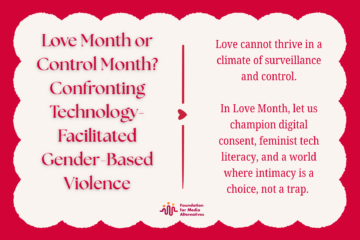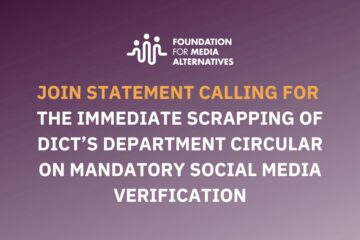FMA signs joint statement on WMW-Pilipinas’ International Women’s Day 2020
Published by Foundation for Media Alternatives (FMA) on
Women Occupy Spaces in the face of Shrinking Democracy World March of Women – Pilipinas
Eleven days ago, the Senate passed the Anti-Terrorism Bill which repeals the Human Security Act (HSA) of 2007, but extends the detention of a suspect following warrantless arrest to fourteen (14) days, from a maximum of three (3) days provided in the HSA. The said bill authored by Sen. Panfilo Lacson also removed the penalty of half a million pesos against erring law enforcers. Sec. 16 of the anti-terrorism bill extended the period for surveillance of suspect’s communications from 30 days to 60 days, which can be extended further by 30 days.
Given the above provisions and the broad definition of punishable acts, the proposed law is very prone to abuse and can be directed towards civil society actors who forward criticism, protest government policies and pronouncements, and defend fundamental human rights. Secretary of Defense Delfin Lorenzana and Senate President Vicente Sotto III, in fact, stated that the passage of the bill would make martial law unnecessary.
The bill supplements Executive Order 70 which was issued by President Rodrigo Duterte in December 2018 and Proclamation 216 of 2017 which suspends the writ of habeas corpus in Mindanao. In the past years, both have been used by state forces not in protecting the people, but in making them more insecure by labeling human rights organizations as ‘dangerous’ that people should stay away from. Killings and illegal arrests against human rights defenders rose in number. Women report sexual abuse by soldiers only to non-government actors for fear of reprisal. Repression of unions and legitimate organizations have been intensifying in the rural areas, while killings and illegal arrests continue in the metropolis and surrounding provinces.
Following EO 70, the Police Regional Office in Region III (PRO3) has started setting up Joint Industrial Peace and Concern Offices (JIPCO) in special economic and freeport zones in Central Luzon, allegedly to prevent militant labor groups from organizing workers’ union in factories and other business establishments. This directly contravenes union rights protected by international human rights law and the national constitution, in the area where labor rights violations are very high. This aggravates the fact that since Duterte came to power, 48 workers and unionists have been killed, including eight (8) women.
Quo warranto has been used to remove the Supreme Court Chief Justice, and quo warranto is now being used against the franchise of a major media network.
Since the government has been headed by a mayor that got away with human rights abuses in Davao, feminist and human rights groups have led public criticism and mass actions to protest the further usurpation by the executive head of the domain of the courts and the legislative branch, as well as the encouragement of killings of the poor, activists and religious, and of abuses against women. Social movements have also been in the forefront of protesting economic policies that has worsened the economic conditions of the poorest, such as the TRAIN Law of 2017, the Rice Tariffication Law of 2019, and the unbridled entry of foreign, particularly Chinese, investors in the power, transport, communication and in the extraction of our natural resources. The Kaliwa Dam project has been revived by the Duterte government and backed by a US$211-million loan from China’s Export-Import Bank.
Clearly, the recent laws are meant to legitimize the silencing of increasing criticism against this government. Worse, the laws seem like a “crony virus” that has facilitated the accumulation of profits by the elite and the imperial power closest to the President to be easier. A case in point is Davao tycoon Dennis Uy who was cleared of smuggling charges, and has ventured into media and telecom, after partnering with China Telecommunications Corp., aggressively bagging government’s infrastructure contracts, and ABS-CBN’s chief digital officer transferring to Uy’s media arm, while the franchise of the TV network hangs in a balance. Davao-based and the President’s close friend Jojo Soliman is head and CEO of Pure Rice Milling Corp, among 174 companies eager on rice importation. The Philippines is now the second largest importer of rice in the world, likely to replace China soon, according to experts. In addition, we are witness to the continued junking of ill-gotten wealth cases against the Marcoses, whom the President admitted to be among his presidential campaign donors.
Since EO 70 was passed, the Pambansang Koalisyon ng Kababaihan sa Kanayunan (PKKK) reported that their members in the rural areas were told not to affiliate themselves with women’s rights groups, yet they see the need to rise and protest against loss of income due to the unregulated entry of imported rice.
Sentro ng Nagkakaisa at Progresibong Manggagawa (SENTRO) reported that soldiers oriented workers in a major company where they organize and told not to join unions affiliated with SENTRO, tagging the latter as communist.
Meanwhile, spaces continue to shrink for women at the barangay levels as local governments actively distribute propaganda materials disparaging women’s rights groups. This creates a chilling effect for women activists working daily to assist widows of extra-judicial killing victims, and empowering migrants’ families, women farmers and indigenous women.
In 2019, 43 human rights defenders were killed in the Philippines, putting our country as second deadliest all over the world. Most of those killed are environmental and indigenous peoples’ rights defenders. The repressive policies work in favor of the big mining and dam construction companies, making it easier for their paid armed groups and soldiers to silence communities.
In the face of all these, our only option is to push back. We need to occupy the political spaces being denied to us, but are rightfully ours as citizens, and as protected by international human rights standards. We must sit down in the streets where we are prevented to protest, in factories where capitalists seek to rake profits unhampered by workers’ demands for rights and living wages, in the fields and indigenous territories where extractivist mining companies, banks and retailers of imported rice are claiming stakes, in urban poor communities where big sex and drug traffickers seek impunity through killings, to take advantage of the vulnerability of women and their families, in schools where authorities try to stunt the wisdom of brave girls!
Human security for us means freedom from violence, both state and gender-based. Human security means food on our tables, secure jobs and living wages, valuation of women’s work, accessible and quality education, indigenous territories that are free from exploitation, sustainability of life, and non-commodification of public services, nature and our bodies! Women shout – NO to Crony Virus, NO to EO 70 and NO to the Anti-Terrorism Bill!
We will show up everywhere, sit down in protest, raise our ladles, pens, fists and roses as weapons of peace and rising power, against the state and its oligarchy’s weapons of hate and murder. We will resist to live! We will march to transform societies!
WORLD MARCH OF WOMEN – PILIPINAS
Bagong Kamalayan Prostitution Survivors’ Collective
Center for Migrant Advocacy (CMA)
Coalition Against Trafficking in Women – Asia Pacific (CATW-AP)
Foundation for Media Alternatives (FMA)
LILAK (Purple Action for Indigenous Women’s Rights)
Pambansang Koalisyon ng Kababaihan Sa Kanayunan (PKKK)
Partido Manggagawa (PM) – Women
SARILAYA
Sentro ng Nagkakaisa at Progresibong Manggagawa (SENTRO) – Women
WomanHealth Philippines
Women’s Legal and Human Rights Bureau (WLB)
Youth and Students Advancing Gender Equality (YSAGE)



0 Comments